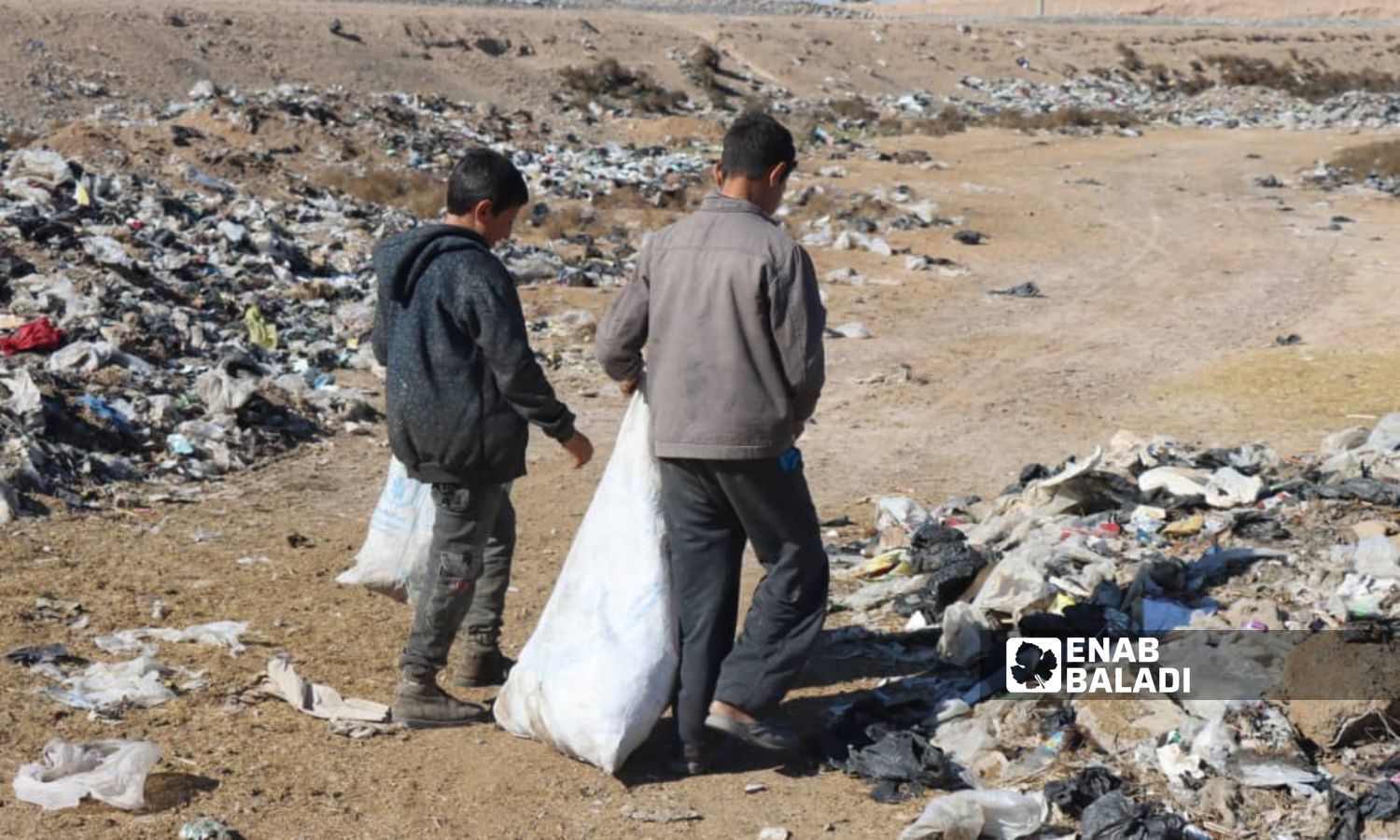



Deir Ezzor – Obadah al-Sheikh
Ahmed al-Khalil’s (44 years old) children are forced to walk long distances, carrying bags made of cloth threads (burlap) on their shoulders for distances that may exceed ten kilometers daily, searching for plastic pieces and scraps from garbage dumpsters and in front of shops.
Al-Khalil, who hails from the village of Dahla in the eastern countryside of Deir Ezzor, told Enab Baladi that he was devastated after losing his leg due to a landmine explosion, rendering him unable to work amidst deteriorating economic conditions.
While al-Khalil is unable to practice any profession, he is forced to employ his four children in collecting scrap, then selling it to meet the family’s daily needs, despite knowing the risks of the profession that begin with their walk at dawn, exposure to stray dogs at garbage dumps, and the skin diseases they might contract due to filth.
Al-Khalil attributed his acceptance of his children scavenging garbage to the lack of job opportunities, the lack of aid, and the absence of activity of organizations and the authorities in the region represented by the Autonomous Administration of North and East Syria (AANES).
The countryside of Deir Ezzor floats on oil wells, making it one of the richest areas in Syria, but children, women, and men can be seen in the early hours of each day walking on roads searching for scraps they can benefit from and sell, close to these wells.
At 4 AM, Rami goes out with his wife, carrying empty bags ready to fill them from trash collection sites. He and his wife share the types of waste they want to collect to sell them to raise money for an operation for their four-year-old daughter, which costs 15 million Syrian pounds (more than $1,000).
Maseera, Rami’s wife, told Enab Baladi that a single bag of plastic soda cans sells for about 35,000 pounds (approximately two and a half dollars, according to the Syrian pound exchange rate at the time of this report).
Sometimes, Maseera works two or three days to fill one bag of plastic cans, stating that her activity is concentrated in rural areas where there are no garbage bins, making the distances between dumps far, which requires more time to reach them.
She added that there are many who work in the large garbage dumps, making her chances of finding what she is searching for slim.
In Syria, 16.7 million people are in need of humanitarian assistance, an increase of 9% from 2023, according to the United Nations High Commissioner for Refugees (UNHCR).
Eighty percent of the Syrian population will need some form of humanitarian assistance in 2024, according to a statistic released on February 12 by the World Food Programme (WFP) concerning the number of people suffering from food insecurity in Syria.
About 55% of the population in Syria, or 12.9 million people, are food insecure, including 3.1 million who are severely food insecure.
In an exclusive interview with Al Arabiya TV channel, the UN envoy to Syria, Geir Pedersen, provided a quick overview of the prominent issues in the Syrian file, starting with the issue of detainees and missing persons, the economic and humanitarian crisis, and the presence of about 12 million internally displaced persons.
He said, “Al-Assad cannot determine the outcome of the conflict in Syria, nor can the Russians, Iranians, Turks, or Americans, nor anyone else,” considering that the situation in Syria is “extremely bleak” with about 16.9 million in need of humanitarian assistance, and nine out of ten people living in poverty.
if you think the article contain wrong information or you have additional details Send Correction